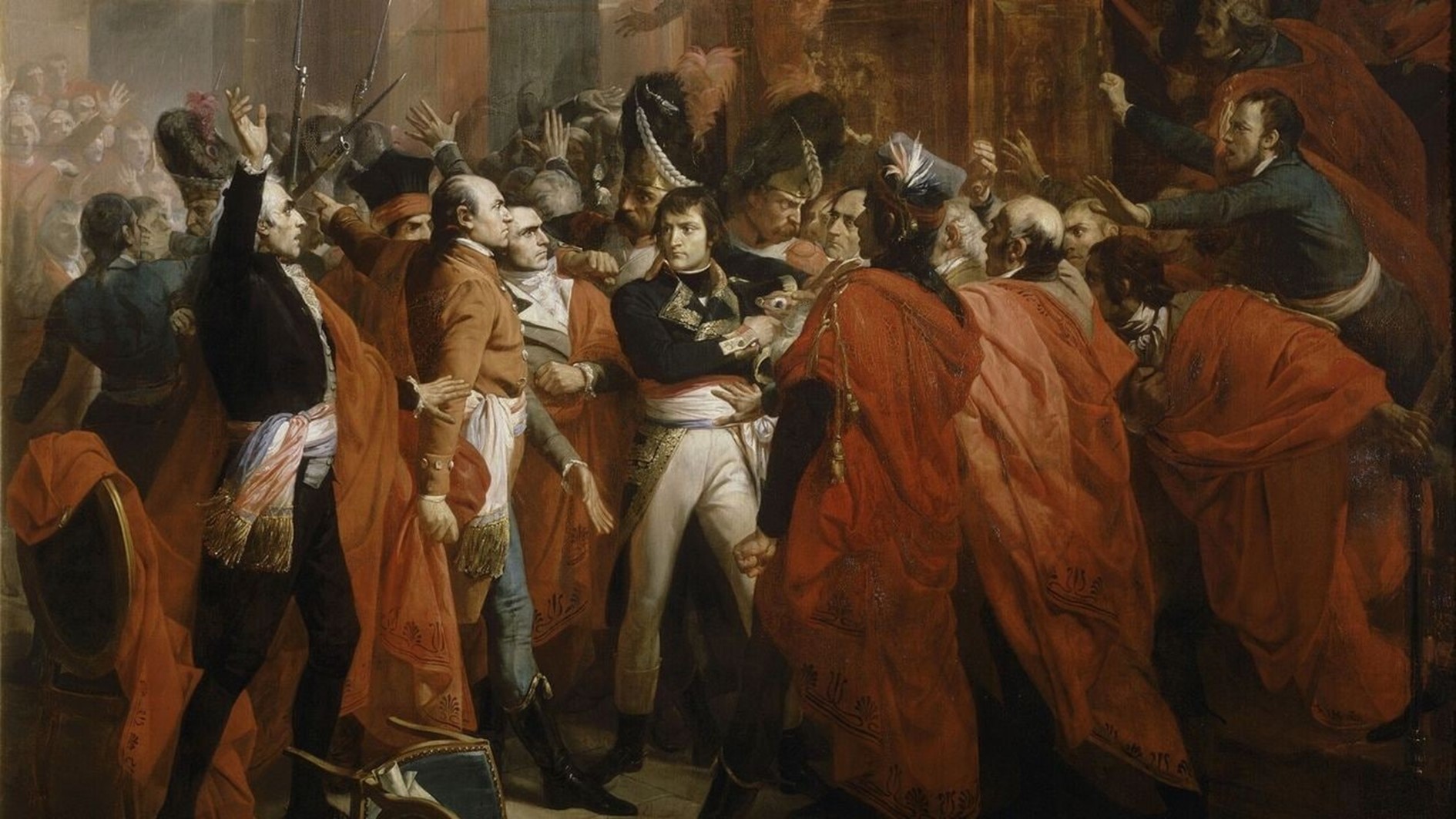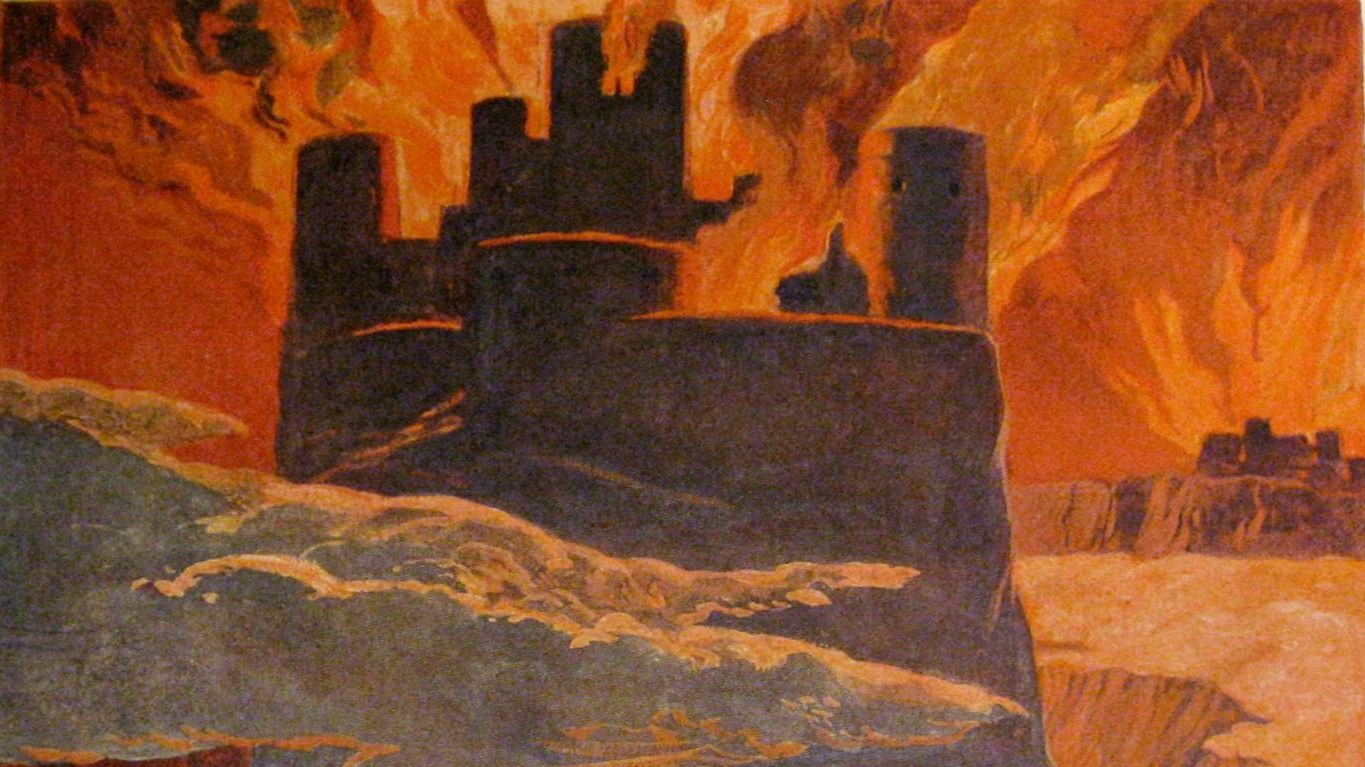At the 20th Congress of the Chinese Communist Party (CPC), Beijing made a claim to form an alternative center of power to the West, calling on developing countries to unite with China to counter Western hegemony.
The 20th CPR Congress concluded in Beijing was truly epochal. It is epochal at least because for the first time in the history of socialist China, the CPC General Secretary was re-elected for a third term, which means that he will soon become chairman of the People’s Republic of China (PRC) for the third time.
Although the Chinese constitution was amended on this issue back in 2018, this did not automatically mean that Xi Jinping would be elected for a third term – too much in China depends on the system of checks and balances, the balance between various factions of political elites, and the compromise of interests between, roughly speaking, the north and south of the country, which has defined Chinese politics for several thousand years.
Given that, along with that, all representatives of the opposition Komsomol clan (people from the Chinese Communist Youth Union, patronized by former PRC President Hu Jintao) were expelled from the Politburo of the CPC Central Committee (the key political structure in PRC), and their places were taken by people loyal to Xi personally and who owe their political rise to him, it is nothing but a crushing of the Komsomol inner-party group. It can only be called a soft, but nevertheless, defeat.
The Congress of the “Centennial Goal”: Key Political Decisions of the 20th CPC Congress
At the 18th CPC Congress in November 2012, the Chinese authorities solemnly proclaimed two historic tasks that China must fulfill – the so-called “two centennial goals“. First, by 2020, the centennial of the CPC, China should build a “middle-income society in all aspects,” and by 2049, the centennial of the PRC foundation, the Communist Party promises to transform China into a prosperous, strong, democratic, civilized and harmonious modernized socialist state.
That is, the 20th CPC Congress by definition could not be an ordinary event, because it was there that the highest Party elite had to state the achievement of the first goal of the era and broadcast the new strategic orientation, according to which China under the leadership of the CPC would go “on a new campaign to comprehensively build a modernized socialist state“.
In addition, it was at this Congress that an anomaly for the Chinese political consciousness occurred – the well-established tradition of power transfer was broken.
In fact, as a result of the 20th CPC Congress, Xi Jinping strengthened his position in power to an unprecedented degree since Mao Zedong. Not least of all, this was possible because almost all representatives of the first and second generations of Chinese revolutionaries, represented by Mao himself and his contemporaries had passed away. Whereas politicians of that generation had unquestionable authority, sometimes no less than Mao himself, such as Deng Xiaoping.
Today, however, the Chinese political “Olympus” is dominated by the children of this old revolutionary guard, or by politicians who had no connection with the legendary revolutionary era and came to power through a system of social elevators, such as the Chinese Komsomol.
The elite groups created by today’s Chinese establishment no longer possess the moral and bureaucratic strength that in the old days made it impossible to form a system of power without a careful search for a balance of their interests.
Here it is important to emphasize that Xi Jinping’s father, Xi Zhongxun, was one of China’s most notable first-generation revolutionaries. It seems that an important detail of his biography is the fact that the politician was born in Shaanxi Province, China. After the formation of the PRC he held leadership positions in the North-Western China autonomous region with Xi’an (now the administrative center of Shaanxi Province), and then he immediately moved to Beijing.
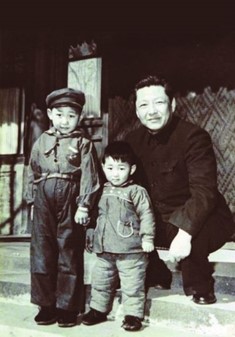
Rossa Primavera News Agency
Xi’an is the birthplace of Chinese statehood because it was the capital of the Qin Empire (under Emperor Qin Shi Huang-di it was called Chang’an). It is in the vicinity of this city where the mausoleum of Emperor Shi Huang-di with his Terracotta Army is located.
Xi’an was also for some time the capital of the Han Empire which succeeded Qin and laid the foundation of the Chinese state tradition for thousands of years (an important detail should be mentioned here: the dynastic color of the Liu dynasty that ruled in the Han Empire was red).
It was to Shaanxi province during the Cultural Revolution that the young Xi Jinping was exiled for re-education after his father was arrested.
It is hard to believe that the native of such a special Chinese region did not relate this legendary story to the reality surrounding him and to himself. The significance of Qin Shi Huang-di for China lies in the fact that he was the first to try to put the interests of the entire Middle Kingdom above the interests of individual regions and ethnic substrata, stopping the “war of all against all” of the Zhanguo (“Warring States“) period.
Even if we assume that these episodes of Chinese history, in reality, did not have any significant impact on the formation of the personality of the future PRC Chairman, in any case, we can state that by the end of his ten-year rule Xi Jinping became the personification of those forces that seek to maximize national sovereignty of the PRC, including by strengthening the vertical power and reducing the centrifugal tendencies.
In China’s reality, this means that the north of the country (roughly speaking, Beijing), defending the interests of a unified Middle Kingdom, is increasing pressure on the interests of the rich and willful south, which for thousands of years has existed under certain conditions of autonomy, at least in the economic sphere, and for which excessive centralization of the state means the loss of many privileges that have already become customary.
The prospects for further strengthening the position of the central government in the country, and most importantly the PRC Chairman himself, are reflected quite indicatively in the decisions of the 20th CPC Congress.
Thus, on the last day of its work, the Congress adopted a resolution to include in the text of the CPC charter a clause recognizing the key role of Xi Jinping in the CPC Central Committee and the Party as a whole, as well as the leading role of Xi Jinping’s ideas about socialism with Chinese characteristics in the new era.
The congress also decided that this would require all Party members to more conscientiously advocate Xi Jinping’s ideas in the CPC Central Committee and the Party as a whole, and to use the authority of the Central Committee to centrally implement Xi Jinping’s ideas.
It was also decided to include a clause in the CPC charter that the Party self-reformation is an endless path. At the same time, the resolution proposed comprehensive measures to ensure that officials are not too dare and have no chance or desire to become corrupt. In parallel, the congress called for comprehensive promotion of efforts to clean up the party ranks.
Moreover, the congress resolution was quite unambiguous in stating that the new era requires all CPC members to strictly follow the party line, which should be a new fundamental requirement for party-building.
All these clauses of the resolution clearly indicate that the era of flexible compromises between various inner-party clans, as well as the delicate balancing of interests between the ruling center and the rich southern provinces, which are the main drivers of the “Chinese economic miracle,” is over and must be replaced by the consolidation of elites under the PRC leader.
However, in this case it is necessary to speak not only about the growth of central power throughout the country, but also about a fairly clear presentation of a new strategic project of China’s development by the center, which should replace the development strategy that prevailed in China until then.
Political swing in China: The competition between the Chimerica project and the Great Middle Kingdom
The current knot of elite contradictions in China, which Xi Jinping quite in a Macedonian way tried to cut, began to form in the late 1970s. China then ventured into open conflict with the USSR and came under the tutelage of Washington, becoming its loyal economic ally.
Over time, the policy of reformation and openness launched by Deng Xiaoping, which allowed China to carry out a successful economic modernization, led to the formation of a pool of political elites advocating the deep integration of the economies of China and the United States.
The Chinese economic miracle turned the country into a global factory, as well as a serious technological power, primarily due to the presence of a huge resource in the form of cheap labor and the desire of Western capital to optimize profits by transferring production facilities to poor and unpretentious Asia (in social, environmental and other aspects).
The project of such symbiosis between China and the United States, and as a consequence, the elites of the two states, was called Chimerica (China + America). In China, the main spokesman for this globalist project was the Komsomol clan, while its partners in the project on the other side of the ocean were the US Democratic Party.
The Komsomol (roughly speaking, liberals), defending the Chimerica project, relied on their positions in the State Council (government) of China, in some rich provinces of the country, as well as in the financial sector, foreign trade, customs, medical and pharmaceutical industry within the Chinese power mechanism.
The pillars of the roughly speaking nationalist-statesmen, the supporters of the Greater Middle Kingdom project, which includes Xi Jinping’s team, are state-owned corporations, the military-industrial complex, the People’s Liberation Army (PLA) of China, and several other security agencies.
The 20th CPC Congress saw the public denouement of an elite conflict that had been smoldering underground for years, during which one political elite or another gained the upper hand through intrigue. What is more, this conflict is not so much about winning positions of power, but rather about securing a public mandate for implementing their strategic project for China’s future development.
The defeat of the Komsomol reflects the fundamental decision of the Chinese political elite to finally abandon the Chimerica project. This project, on the one hand, provided China with unprecedented economic growth, turning it into the second economy of the world, but at the same time made this economy critically dependent on the United States.
The social liberalization carried out by the Komsomol against the background of building a close partnership with the United States allowed Washington to influence Chinese society unimpeded through its soft power.
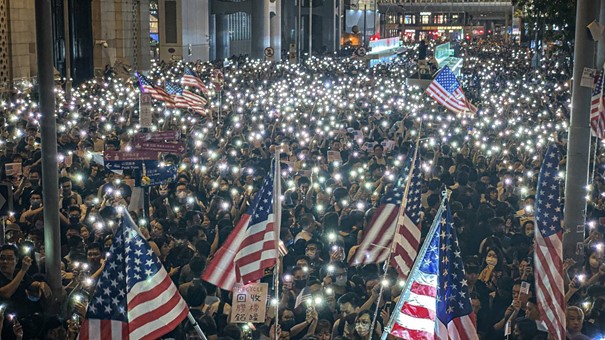
Rossa Primavera News Agency
All this gave rise to the understanding in China that, given the new Cold War unleashed by the US, as well as increasingly tough actions to restrain China’s development, the Chimerica project begins to fundamentally contradict the national interests of China, and therefore must be abandoned.
Xi Jinping, in this regard, put forward the thesis of the need to ensure the sovereignty and territorial integrity of the country in the first place. The Chinese leader said frankly at the Congress that China sees interference of external forces as the main threat.
From the rostrum at the 20th CPC Congress, Xi Jinping declared that the most important strategic task for China today is to accelerate modernization of the armed forces and increase their combat readiness. The Chinese leader demanded that these processes be completed by 2027.
Xi Jinping spoke even tougher on Taiwan, saying that the reunification of China and Taiwan is inevitable and Beijing reserves the right to use force to prevent interference by outside forces.
At the same time, the PRC Chairman emphasized the successes of Chinese modernization, and said that China’s experience can be used by other developing countries.
In fact, at the 20th Congress of the CPC, Beijing made a claim to form an alternative to the West center of power, calling on developing countries to unite with China to oppose the hegemony of the West.
The ritual political reprisal against the Komsomol inner-party group
The crushing of the Komsomol group became evident when the new Politburo of the CPC Central Committee was approved. They ousted the Komsomol leader Hu Jintao’s appointees: Li Keqiang, the former Premier, Hu Chunhua, Vice Premier of the State Council, and Wang Yang, President of the Chinese People’s Political Consultative Conference and former leader of the richest southern province of Guangdong.
Xi Jinping himself and his two loyal comrades retained their positions in the Politburo: Zhao Leji, Secretary of the CPC Central Commission for Discipline Inspection, which is of key importance to the Party from an administrative point of view, and Wang Hongning, Secretary of the CPC Central Committee.
Also included in the Politburo were Xi’s direct protégés who owed their political rise to him, namely Li Xi, head of the CPC Guangdong Provincial Party Committee, and Cai Qi, head of the CPC Beijing Municipal Committee.
The Politburo also included two Shanghai officials: Ding Xuexiang, head of the CPC Central Committee Office, and Li Qiang, head of the Shanghai CPC City Committee. Moreover, according to experts, these two officials are not tightly linked to the old “Komsomol clan” and rather represent the new regional elites, and in any case, they will be extremely loyal to the PRC Chairman.
The key act of political reprisal against the opposition was the humiliating expulsion of Komsomol leader Hu Jintao from the presidium of the Congress on the last day of its work.
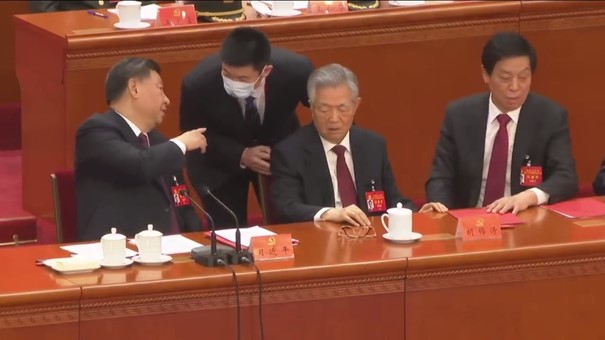
Rossa Primavera News Agency
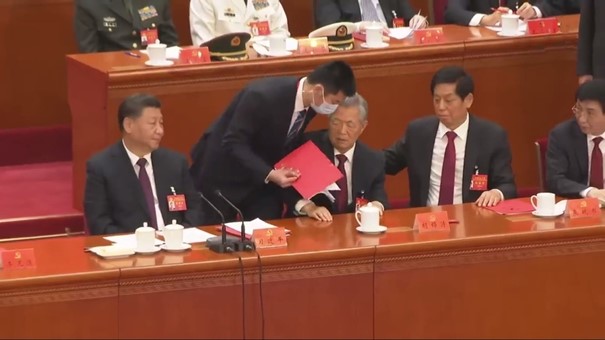
Rossa Primavera News Agency
Given China’s ritual-driven political culture, it is highly unlikely that this action was an accident or a misunderstanding.
The process of evicting the elderly Hu Jintao by two assistants, which was broadcast nationwide, cannot help but associate Hu with US President Joe Biden, who has been regularly mocked in the Chinese press for his disorientation.

Rossa Primavera News Agency
In this way, the faction that opposed Xi Jinping was not only crushed administratively, but also subjected to ritual humiliation, as its leader was portrayed as a frail old man, unable to walk a few steps without help.
The official comment by the state-run Xinhua news agency that Hu left his seat because he is unwell and in need of a rest only reinforced this perception, while revealing Xi Jinping as a caring leader who is also thoughtfully taking care of a respectful but decrepit old man.
What should Russia prepare for?
Radical reshuffles in the highest political elite of the PRC are obviously a reaction to the constantly aggravating foreign policy situation, against which there is no point in talking about any “Chimerica”. Such a reconfiguration of the elite could not take place without meeting the challenges of the times.
The US is steadily building up its capacity to restrain China in the vicinity of its borders. The increasingly blatant militarization of Japan, which is being tuned to counter China, the US creation of the AUKUS military alliance and the transfer of US nuclear submarines to Australia under its cover, and most importantly the increasingly explicit interest of Washington to apply the Ukrainian scenario in Taiwan has demanded a strategic response from Beijing.
Xi Jinping made a strong move at the 20th CPC Congress to consolidate the top party elite around himself and ensure the stability of his own power for at least the next ten years.
China’s attempts to establish itself as the leader of developing countries seeking to throw off US hegemony so far look extremely vague. It is more likely to be China’s traditional position that the Middle Kingdom should be fully self-sufficient, eliminating its shameful dependence on the West.
In any case, China cannot establish autarchy and challenge US hegemony on its own, which is why it seeks to establish a union with developing countries, including Russia, on various grounds.
For our country, the strengthening of Xi Jinping’s position and the defeat of the “Komsomol” opposition is extremely important, because the Komsomol group affiliated with the US Democratic Party had a critical attitude towards deepening relations with Russia. Given that this group controls a significant part of the Chinese economy, it has often interfered with Russia-China economic ties.
Beijing’s toughening of relations with the West is even more beneficial for Russia, since Russia becomes a key ally for China that has lost illusions of befriending the United States and officially declares its intention to challenge American hegemony.
Source: Rossa Primavera News Agency

